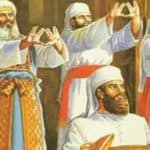 or the requirements of leadership.
or the requirements of leadership.
Parshat Emor (Leviticus 21:1–24:23)
by Moshe Kempinski
The kohanim as a model for the requirements of leadership – as early elections are announced.
As Israel sinks into the mire of pre election fever it would be instructive to look to the Parshat Hashavua (weekly Torah portion) for insights into what true leadership actually entails.
The parsha begins with the words;
“And HaShem said (VaYomer) to Moshe: Speak (Emor) to the Kohanim,the sons of Aaron, and say (VeAmarta) tothem: Let none [of you] defile himself for a dead Soul (Nefesh) among his people” (Leviticus 21:1)
It would be instructive to focus on the use of two words used in the verse. The first is the use of the word Nefesh (soul) in the context of the verse. The second focus would be the repetitive use of derivatives of the word Amar (spoke).
The word ‘soul-Nefesh’ in this verse does not actually refer to soul of the dead person with whom the Kohen comes into contact. It refers to the soul of the Kohen. That is to say an alternate understanding of the verse would be something like:
For the sake of the soul of the Kohen, he shall not defile himself by contact with a dead person….among his people.
The Kohen does not stand in for the people of Israel and he is not an intermediary. He actually is an extension of the people’s yearning for G-d on the one hand and is a tool through which G-d blesses that yearning on the other.
That is the reason that when the kohanim bless the people, they must cover themselves with their prayer shawl. The people who are being blessed must be covered in a similar fashion. This is so that neither the Kohen nor the people make the mistake that this delegated individual is the source of the blessing. The source of the blessing is clearly HaShem.
“So shall they put My name upon the children of Israel, and I will bless them.“ (Numbers 6:27)
The confrontation with death is both a frightening and soul searing experience. It wounds the soul and casts a pall of sadness and a frail and weakened sense of mortality.
The kohanim were responsible for service at the Temple two weeks of the year, while during the other fifty weeks, their role was to teach, inspire and give hope to the people. If their soul is damaged or singed by the experience of death, they forfeits his opportunity to be the expression of the people’s yearning for worship and holiness This is why they needed to avoid direct contact with death. In general, the kohanim needed to be wholesome and hopeful. That is the reason they were subject to so many of the physical and familial restrictions we read about in the parsha.
The kohanim were destined to be symbols and metaphors. All true leaders must be aware that this demanding role and position is expected and needed from them as well.
That is the reason that the Torah portion begins with the repetitive use of derivatives of the word VaYomer (he spoke). Throughout the Torah we had been accustomed to reading the words VaYidaber HaShem (and G-d told) Moshe Le-Emor (to speak).
Our Sages tell us that the difference between “Vayomer”(he spoke) and “Vayidaber” (he told) is that the latter is a harsher type of speech, while the former is much softer Furthermore, Dibur is always the concise, pregnant expression of G-d’s Will , while “Emor” is the full and revealed explanation of that Will.
The word that is used for speech in the description of creation in the book of Genesis is different from the word that is used for speech at Mount Sinai. The creation of the world was facilitated by the Ten Maamarot, the ten compassion-filled expressions of creation. The ten statements or commandments at Mount Sinai are called the Asseret Hadibrot.
G-d is then charging the kohanim with leadership and the obligations of being a role model. As a result, He is demanding of them a higher level of responsibility, self denial and sacrifice. Yet, as Rav Moshe Feinstien (zt”l) explains He does so with the compassionate use of the word EMOR.
It is to that high standard that we need to look for and aspire to in our leadership. It is a painful truth that such higher levels of responsibility and representation are almost nonexistent in the array of people yearning to lead this nation. In many ways, our leadership is simply an extension and mirror of the level of awareness and connectedness of our people. Yet we cannot cease to look for and yearn for much more. May we be found worthy of it.
